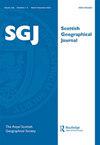河流地貌学和景观形态学:跨越时间尺度的协调概念
IF 2
4区 社会学
Q2 GEOGRAPHY
引用次数: 1
摘要
保罗·毕晓普发表的许多著作都可以归入河流地貌学的范畴。他独特的方法是使用河流的证据来质疑关于景观演变的假设,这一努力不可避免地导致了在空间和时间尺度范围内协调证据。在这里,从保罗的工作的例子被用来展示他的方法和他对当前景观演变的理解相当大的贡献。尽管河流长剖面综合了多种边界条件和外部强迫因素的影响,但它揭示了许多景观历史。经验、理论和模型研究表明,对于基岩河流切口中沉积物的作用和气候变化后的瞬时行为等基本问题,多长时间的剖面可以进行解释。瞬时性景观反应的复杂性支撑了Paul的大部分工作,这里用内华达山脉、西班牙和纳米比亚的例子来说明现代分析技术如何彻底改变了对这种瞬时性的理解。对Paul对河流地貌学和更广泛的地貌学学科的贡献进行了评估,并指出了他的贡献的持久性,以及他的合作者,特别是他的研究生,已经并将继续产生的巨大影响。本文章由计算机程序翻译,如有差异,请以英文原文为准。
Fluvial geomorphology and landscape morphology: reconciling concepts across timescales
Much of Paul Bishop’s published work can be classified under the heading of fluvial geomorphology. His distinctive approach was to use fluvial evidence to interrogate hypotheses regarding landscape evolution, an effort that inevitably led to reconciling evidence across a range of spatial and temporal scales. Here, examples from Paul’s work are used to demonstrate his methodology and his considerable contributions to current understanding of landscape evolution. River long profiles reveal much about landscape history, although they integrate the effects of multiple boundary conditions and external forcing factors. Empirical, theoretical and modelling studies show how long profiles can be interpreted to address fundamental questions regarding the role of sediment in bedrock river incision and transient behaviour following climate change. The complex nature of transient landscape responses underpins much of Paul’s work, and here examples form the Sierra Nevada, Spain and Namibia are used to illustrate how modern analytical techniques have revolutionised understanding of this transience. An assessment is provided of Paul’s contributions to fluvial geomorphology and the wider discipline of geomorphology as a whole, noting the longevity of his contribution and the considerable impact that his collaborators, particularly his research students, have made, and continue to make.
求助全文
通过发布文献求助,成功后即可免费获取论文全文。
去求助
来源期刊

Scottish Geographical Journal
GEOGRAPHY-
CiteScore
1.80
自引率
20.00%
发文量
19
期刊介绍:
The Scottish Geographical Journal is the learned publication of the Royal Scottish Geographical Society and is a continuation of the Scottish Geographical Magazine, first published in 1885. The Journal was relaunched in its present format in 1999. The Journal is international in outlook and publishes scholarly articles of original research from any branch of geography and on any part of the world, while at the same time maintaining a distinctive interest in and concern with issues relating to Scotland. “The Scottish Geographical Journal mixes physical and human geography in a way that no other international journal does. It deploys a long heritage of geography in Scotland to address the most pressing issues of today."
 求助内容:
求助内容: 应助结果提醒方式:
应助结果提醒方式:


